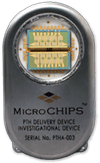Remote Controlled Contraceptive Chips For Women
Intra-uterine devices (IUDs) offer sure-shot method for reversible birth control but these require clinic visits and outpatient procedures that certainly no one would enjoy. Massachusetts-based startup MicroCHIPS has made a remote controlled chip implant that releases a contraceptive hormone called levonorgestrel. If they wish to concieve, the device can be turned off with a simple press of a button. While normal contraceptive devices can't last for more than 5 years, MicroCHIPS' contraceptive implant is designed to work for 16 years, nearly half the reproductive life of a woman.
 The concept was conceived (no pun intended) by Larry Sanger of MIT, who was asked to design such a device by none other than Mr. Bill Gates and his colleagues. Sanger had previously worked on controlled drug release micro-chip implant with Michael Cima and John Santini in the 1990s and the technology was licensed to MicroCHIPS company, now managed by Brad Paddock and Robert Farra and has Langer and Cima on its advisory board, among others.
The concept was conceived (no pun intended) by Larry Sanger of MIT, who was asked to design such a device by none other than Mr. Bill Gates and his colleagues. Sanger had previously worked on controlled drug release micro-chip implant with Michael Cima and John Santini in the 1990s and the technology was licensed to MicroCHIPS company, now managed by Brad Paddock and Robert Farra and has Langer and Cima on its advisory board, among others.
The device measures 20 x 20 x 7 millimetres and can be implanted under the skin of abdomen, upper arm or the buttocks. 30 micrograms of levonorgestrel (lasting 16 years) is released from the 1.5 centimetre wide reservoir. The seal of the reservoir is made of sterile platinum and titanium material. An internal battery supplies current that temporarily melts the seal and allows the small dosage of the hormone to pass into the bloodstream. The real challenge in making the device proved to be the fuse-like membrane, MicroCHIPS President Robert Farra quoted. Also, the dosage amount can be adjusted remotely by doctors.
Work on this device is still going on before it is presented to the Food and Drug Administration for commercial use in 2018. MicroCHIPS' timing couldn't have been better. A recent convention of governments, companies, charities, and NGOs called for providing 120 million women with family planning measures by 2020. This would call for more companies to come up with innovative ways of family planning.
MicroCHIPS' novel drug delivery technology may further inspire companies to develop similar products for conditions like diabetes, blood pressure, epilepsy, etc. What do you think about this new technology? Share with us in the comments.
Source: #-Link-Snipped-# via #-Link-Snipped-#

The device measures 20 x 20 x 7 millimetres and can be implanted under the skin of abdomen, upper arm or the buttocks. 30 micrograms of levonorgestrel (lasting 16 years) is released from the 1.5 centimetre wide reservoir. The seal of the reservoir is made of sterile platinum and titanium material. An internal battery supplies current that temporarily melts the seal and allows the small dosage of the hormone to pass into the bloodstream. The real challenge in making the device proved to be the fuse-like membrane, MicroCHIPS President Robert Farra quoted. Also, the dosage amount can be adjusted remotely by doctors.
Work on this device is still going on before it is presented to the Food and Drug Administration for commercial use in 2018. MicroCHIPS' timing couldn't have been better. A recent convention of governments, companies, charities, and NGOs called for providing 120 million women with family planning measures by 2020. This would call for more companies to come up with innovative ways of family planning.
MicroCHIPS' novel drug delivery technology may further inspire companies to develop similar products for conditions like diabetes, blood pressure, epilepsy, etc. What do you think about this new technology? Share with us in the comments.
Source: #-Link-Snipped-# via #-Link-Snipped-#
0
